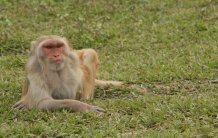
Researchers studied rhesus macaques at the Cayo Santiago field station in Puerto Rico (photo: Lauren Brent)
Some monkeys prone to isolation
Some individual animals are prone to social isolation, new research suggests.
The study of rhesus macaques showed some of the monkeys remain socially isolated for much of their lives, suggesting their isolation is caused by a persistent trait or traits.
The researchers – from the universities of Exeter, Puerto Rico and Pennsylvania – believe the cause is a mixture of their genes and other factors such as age, sex and family size.
Social isolation is linked to reduced life expectancy in many species, including humans.
“Understanding social isolation is really important, and studying macaques might give us clues about human behaviour,” said Dr Lauren Brent, from the University of Exeter.
“Isolation is the latest epidemic among humans, and research has suggested it is as bad for us as smoking 15 cigarettes a day.
“Given the benefits of social integration, we need to understand why some individual animals tend to be socially isolated.”
The researchers measured integration by observing how much time macaques spent grooming others and being groomed – a key social behaviour for the species.
The factors that played a role in isolation were age, sex, social status, group size and how long a macaque had belonged to a social group.
However, the identity of an animal’s mother did not play a role, suggesting behaviour that leads to isolation is not learned from the mother.
Dr Brent said the findings suggest isolation could be partly maintained by natural selection – meaning there might be some evolutionary benefits.
The paper did not examine this in detail, but the possible benefits of isolation include lower risks of disease and conflict.
The data came from 429 adult rhesus macaques at the Cayo Santiago field station in Puerto Rico, which was devastated earlier this year by Hurricane Maria.
Researchers including Dr Brent have raised more than £70,000 to repair the field station and support people living nearby.
The paper, published in the journal Scientific Reports, is entitled: “Persistent social isolation reflects identity and social context but not maternal effects or early environment.”
Date: 19 December 2017
